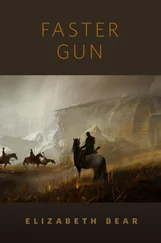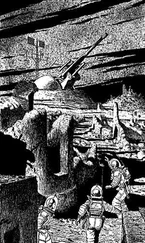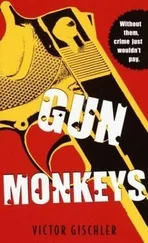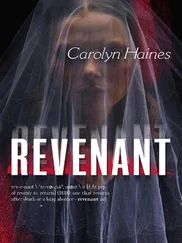“Yes,” he said. “Yes, I’d like that.”
He didn’t know if servitors lied; if Hemiola had any connection to the servitors on the Revenant , who had spared him but killed his Kel. The only way he could find out was by getting closer to Hemiola. Not much of a reason to live, but it was what he had.
Jedao rose and dismissed the euthanasia request form that had come up on the main display. “You should go,” he said. “You don’t want the Shuos hexarch’s people to catch you here.” He assumed that the servitors had some way of jinxing surveillance—and that, too, was something he wanted to learn more about.
“I will come to you another time,” Hemiola said. “Take care, Jedao.” It hovered up to a maintenance passage and quickly vanished from sight.
Jedao shivered, eyes blurring. It was tempting to give up anyway. To close his eyes and pretend he had returned to Kujen’s care, living in rooms as luxurious as sunlight. That in a moment he would change into the Kel uniform he found and that Kujen would greet him, smiling and amused and heartrendingly beautiful.
But he had chosen otherwise, and he would have to live with that.
He picked up the deck of cards and took it into the bedroom. One by one he arranged the cards on the bed, making no effort to order them. He would never see Talaw again, or find out what had become of them, or the rest of the Kel in the swarm. It was better that way.
The cards took up an inordinate amount of space, and had an irritating tendency to slide around on the subtle slopes formed by the blanket. The Deuce of Gears, alien in silver and black, had turned up in the sixth column. Jedao plucked it out and stuck it on top of a dresser face-down. He didn’t need it anymore. Then he put the rest of the cards back in their box. The deck was no longer good for fortunetelling or playing (fair) jeng-zai, but neither endeavor interested him.
Then Jedao went back out to the study to begin his work. It was time to change the game.

EPILOGUE
THE SHUTTLE MADE planetfall in a slow, imperfect arc, turning this way and that to give its passengers a good view of the small settlement they were approaching. Earlier they had passed over a worn-down series of mountains and the purple-green forest at its base. It wasn’t much of a view, but the shuttle’s pilot seemed determined to make the best of it, talking up this boulder or that formation of trees as though they had been designed by a master landscaper for their viewing pleasure. Cheris, who had taken a seat near the back, conceded that this wasn’t impossible. As far as she could tell, though, the trees looked like they had been growing wild for some time. Haphazard terraforming, perhaps, or simple neglect.
During the flight, people had talked about simple things. Births and marriages and deaths. Fashion. The best recipe for lamb with yogurt. A stray discussion of a math problem, which she had to bite the inside of her mouth from joining in, because the two young people (students?) were both wrong about order of operations. It was not, however, her job to correct them... yet.
Cheris had modded her face, a concession to safety, with the aid of a surgeon recommended by Mikodez. “You didn’t want to be devastatingly beautiful?” he’d asked in disappointment after he saw the results he’d paid for—what he called a “professional courtesy.” “You should have taken advantage.”
She’d shaken her head and said, amused, “I’m trying to fit in. My people don’t generally go in for fancy expensive mods, remember?” And he’d let the subject drop.
The shuttle landed lightly, like a butterfly, and she reached for her duffel bag. She hadn’t brought much in the way of belongings, just a bare minimum of clothes, and her raven luckstone, and the watch that General Khiruev had given her. The Welcome Committee had assured her that they’d provide new settlers enough to get started with, courtesy of their Shuos benefactors. (Cheris would never quite believe Mikodez had rescued some of her people out of principle, but she couldn’t deny that he’d saved them from extinction.) She’d already secured her housing assignment, which she’d be sharing with several other singletons. Mwennin preferred to live with relatives, but the purge nine years ago had splintered many extended families. The survivors would have to make do.
Cheris was last off the shuttle. A number of the other passengers had already gravitated toward the small crowd waiting to greet them. Some of them called out to each other, embraced. She watched them, ambivalent, feeling like an impostor.
Then a woman detached herself from the greeters and came toward Cheris. She addressed Cheris in rapid Mwen-dal.
Cheris shook her head, flushing. “I’m sorry,” she said haltingly, doing her best to suppress Jedao’s drawl. “My Mwen-dal isn’t very good. I came here hoping to learn.”
The woman patted her shoulder. Cheris held still for it. This time when the woman spoke, she used the high language, flavored with an unfamiliar accent. “I’m Oru, one of the interpreters. You’re one of the settlers? Not a visitor?”
“Yes,” Cheris said. True enough for the moment. After the events of the past decade, she was looking forward to a quiet life. “My name is Dzannis Paral.” Another favor she owed Mikodez: he’d set up the false identity for her.
Oru’s face brightened. “The math teacher! The school’s been looking forward to your arrival. They’ve been short-handed, and the little ones do get squirrely when they’re going through tutorials for the tenth time, and their ‘teachers’ don’t know enough about the material to go over it with them.”
As Oru continued to chatter, Cheris felt herself relaxing for the first time in a long time. It wasn’t the future she’d envisioned for herself once upon a time, when she’d defied her parents to join the Kel, or the one she’d thought she’d committed herself to when she took up Jedao’s cause. But even small things made a difference sometimes.
“Thank you,” Cheris said after Oru had finished her speech. She said it in Mwen-dal.
“Like this,” Oru said, correcting her pronunciation with a smile.
Cheris repeated the words carefully.
“Come with me,” Oru said, first in Mwen-dal, then in the high language. “I imagine you’re hungry.”
“I am,” Cheris said, and followed Oru toward her new home.
Learning the language of her mother’s people wouldn’t bring back all the Mwennin who’d been slaughtered, and teaching mathematics to schoolchildren wouldn’t unknot the centuries of damage the high calendar had done to society. But that didn’t mean those things weren’t worth doing. Someone had to carry on with the small acts that kept civilization moving. And this time it was her turn.
THANK YOU TO the following people: my editor, Jonathan Oliver, and the wonderful folks at Solaris Books; my agent, Jennifer Jackson; and my agent’s assistant, Michael Curry.
I am grateful to my beta readers: Joseph Charles Betzwieser, Cyphomandra, Daedala, Seth Dickinson, David Gillon, Isis, Karanguni, Helen Keeble, Nancy Sauer, and Sonya Taaffe. Additional thanks to Sam Kabo Ashwell for providing an emergency Kindle when I was working on revisions after the flood; to Andrew Plotkin and Helen Keeble for their thoughts on the calendrical lock; to Peter Berman for help with the mathematics of the threshold winnower; and to Lila Garrott-Wejksnora for information on military funerals. All errors and narrative license taken are, of course, my own.
Читать дальше













